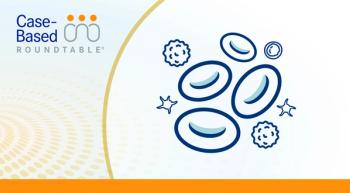
Paul Barr, MD: Phase III Data to Support Usage of Bruton's TKIs
What phase III data support the use of a Bruton's tyrosine kinase inhibitor in this patient?
The best phase III data supporting a BTK inhibitor in such a patient go back to the Resonate study, the randomized trial comparing ibrutinib and ofatumumab. In that trial, patients were heavily pretreated, having received a median of three prior regimens. Most of the patients had already been treated with purine analogsbendamustine, anti-CD20 antibodies—and about 40% were considered resistant or refractory to purine analogs. It does really relate to this patient, who is having an inferior response to cytotoxic therapy. Despite that we’re running out of treatment options, we did see a pretty dramatic improvement in PFS compared with ofatumumab as well as the OS benefit.
Case 2: Relapsed and Refractory CLL
James S. is a 67-year-old college professor from Ithaca, New York; he is a Vietnam veteran with a history of treatment for Agent Orange exposure; his history is also notable for prior smoking (15-pack year) and mild COPD.
In November 2013, he presented to his PCP for a routine physical; his examination showed mild lymphadenopathy and his CBC showed evidence of lymphocytosis (lymphocytes 6 x 109/L); he was referred to an oncologist for further diagnostic evaluation.
Differential diagnosis showed B-cell CLL, with absolute lymphocytosis (19,000/mm3) and flow cytometry positive for CD5 and CD23.
Interphase cytogenetic analysis showed no deletion of 17p.
The oncologist initiates treatment with bendamustine/rituximab (BR) and James shows improvement in hematologic parameters after 6 cycles.
James was out of the country at a meeting, and he failed to return for a scheduled follow-up appointment in January 2015.
In March 2015, he presented to his oncologist with symptoms of unintentional weight loss over the past 2 months (>10%), severe fatigue (interfering with work), and dyspnea; his CBC is consistent with worsening anemia and thrombocytopenia.
CT scan shows evidence of extensive abdominal lymph node recurrence.
At the time of his recurrence, James’s ECOG performance status was 2, and liver and kidney functioning were within normal limits.

















